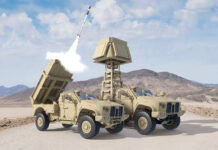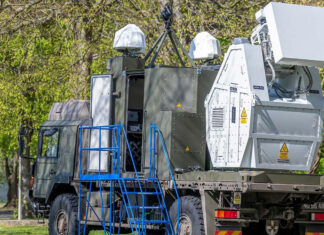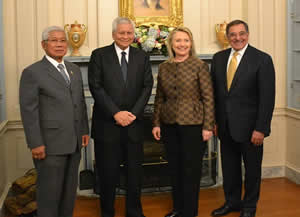
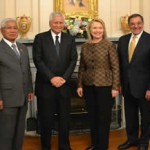
Against a backdrop of a Filipino-Chinese standoff in a small corner of the South China Sea, senior US and Filipino representatives concluded defense discussions 30 April with a firm commitment to fully honor their respective mutual defense treaty obligations.
US Secretary of State Hillary Clinton and Secretary of Defense Leon Panetta, in meetings with Filipino Foreign Secretary Albert del Rosario and Defense Secretary, discussed a wide range of topics focused on strengthening their defense alliance along with cooperative strategies to intensify economic and cultural development projects.
Since 8 April, Chinese and Filipino naval vessels have been locked in a face-to-face standoff at Scarborough Shoal in a tense dispute over territorial claims on the area. Scarborough Shoal, located some 200 kilometers west of the northern Filipino island of Luzon, is little more than a scraggly atoll-shaped collection of rocky outcroppings. The main attraction of the area is the richness of its aquatic life making it a highly lucrative fishing ground. Sovereignty over the Shoal is claimed by China and Taiwan with the Philippines joining the sovereignty fray in 1996.
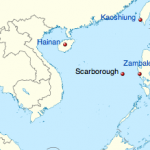
Although efforts are still ongoing to arrive at a diplomatic settlement of this dispute, both China and the Philippines continue to pursue their aggressive claims to a right of ownership of the area. The Philippines has accused China of provocative “bullying” maneuvers and some Filipino lawmakers have encouraged their government to stand strong.
Following the discussions, Secretary del Rosario stated that the US representatives indicated that the United States would fulfill its “obligations under the mutual defense treaty” should Filipino forces come under attack at Scarborough Shoal. Under the terms of the treaty, both nations are committed to defending each other should they be attacked. Until the conclusions of the 30 April discussions it was unclear if the United States would intervene on behalf of the Philippines in the Scarborough standoff.
Statements made by Secretary Clinton following the meetings clarified this issue when she announced that the United States opposed the “threat or use of force” by any nation in an effort to settle a territorial dispute. During a press conference, she stated that the United States would not “take sides on the competing sovereignty claims to land features in the South China Sea.” She added that the United States encouraged all nations to pursue a diplomatic approach to resolving contentious issues.
She went on to say that the United States remains committed to ensuring that Pacific sea lanes remain open to international shipping and freedom of seaborne navigation is guaranteed. A priority, she stated, is “the maintenance of peace and stability” in the Pacific, a key national interest of the United States as a “Pacific power.”
Foreign Secretary del Rosario said that the Philippines was working to enlist help from the Association of Southeast Asian Nations (ASEAN) to settle the Scarborough standoff with China, but the Association has so far taken no action. Filipino efforts to solicit assistance from the UN to settle the disagreement are not likely to succeed as China is firmly opposed to UN involvement. He went on to say that the United States promised to support the Philippines when the dispute is brought before an international body provided a hearing adheres to a “rules-based approach.”
The Philippines and the United States have been engaged in discussions focused on increasing military cooperation between the two nations for more than a year now. Any expansion of a US military presence in the Philippines is a sensitive issue that has been the subject of rather intense controversy in the Philippines. Since the closure of the permanent US facilities in the Philippines in 1992, any reestablishment of a permanent US presence always stirs up heated debates among Filipinos.
The United States has also promised to assist the Philippines modernize, train, and equip its naval and air forces and would honor its obligations outlined in the US-Philippine Mutual Defense Treaty. With the movement of US Marines out of Okinawa and President Obama’s determination to “pivot to Asia,” the Philippines represents a critical ally in America’s Asia-Pacific strategic realignment, an ally that must be nurtured and strengthened.



